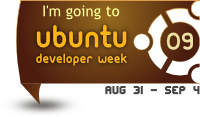Hey! Welcome to my site. You may want to subscribe to my RSS feed. Thanks for visiting!
- Had flu the last month or so, finally been getting over it this week, starting to feel human again. I thought I had H1N1, but I had it checked and it turns out it was just a nasty flu. My concentration was just gone the last month so I ended up watching a lot of old Star Trek Voyager and Third Rock From the Sun episodes.
- Kind of bummed that the rest of the world gets to see District 9 already, and in South Africa, where the story actually plays off, we only get to see it in a week from now on the 28th of August.
- Attended the Obstreperous Olive Geekdinner at the Pasta Factory. Staff was very friendly, food could have been better for the price. Talks were a bit too markety and “done”, as a result I’m volunteering for a more geeky talk next month. Overall it was very good and I got to catch up with a few people I haven’t seen in way too long.
- I got my first few packages in Ubuntu, I’ve been working on LTSP cluster (packages.ubuntu.com seems to have some trouble currently) packaging and 5 out of the 6 packages are currently in the archives. ltsp-cluster-pxeconfig is next, it’s in REVU at the moment, it should make it in before feature freeze next week. Thank you to Stéphane Graber who has been mentoring me on this, he’s also the upstream for LTSP Cluster and sponsoring my packages. Also thanks to Jordan, Oliver and Anthony for reviewing my packages on REVU.
- Ubuntu-ZA is having monthly meetings now, I was kind of dazed at the last one due to flu and medicine, but it’s refreshing to see the energy and enthusiasm, we’ll have the first of our monthly reports ready within the next week or so.
- Edubuntu is in a bit of a squeeze. The good news is that a DVD install disc and enabling universe packages for the builds have been approved, unfortunately the Edubuntu seeds need work and need to be finalised within the next week or so, and our two core-devs have had other urgent issues to tend to. If there’s a core-dev available to give some guidance and sponsorship over the next week, it would be much appreciated.
- Some other nice things in my feed reader from the Ubuntu world:
- 100 Paper cuts is at round 7, I think David Siegel is really cool for taking it on and sticking in there with it.
- Daniel Holbach blogged about the Ubuntu Global Jam, some of us in CLUG considered doing a package jam for a CLUG talk, but due to time limitations and the recent threads on the CLUG lists where users are requesting more intro-level talks, I’m wondering whether we should have a kind of tips-and-tricks jam, where a bunch of us show how we use Ubuntu to be more productive.
- Ubuntu Developer Week is kicking off in a bit more than a week, be sure to be there if you’re interested in contributing to Ubuntu!
- Free Ubuntu Books for approved loco teams, also a copy of Art of Community. Ubuntu-ZA applied for the first 2 books that will be hosted at AIMS in Cape Town and available for anyone who wants to drop by and read it. We’ll probably keep the Art of Community book in Johannesburg somewhere under a similar arrangement.








